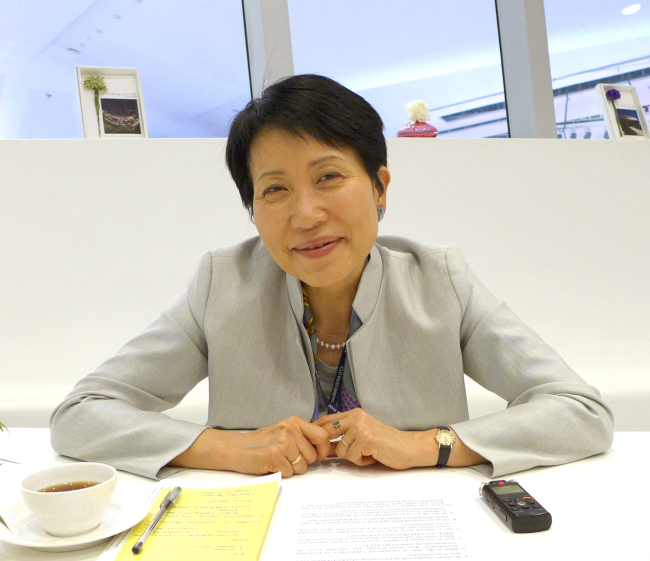The international community must stop putting climate change on the back burner of its development agenda, the head of an environment institution has stressed, while urging organizations to team up for worldwide water management.
Naoko Ishii, the president of the Global Environment Facility, which funds projects to improve the global environment, said the challenge was to sustain growth without compromising environment preservation.
The GEF unites 183 countries with international institutions, civic groups and companies to plan and enforce sustainable development. Since 1991, the organization has provided $13.5 billion in grants and leveraged $65 billion toward 3,900 projects in 165 countries to protect groundwater.
“Our industrial activities for the last two centuries have eaten away at the earth’s carrying capacity in climate, water, forest and land,” Ishii told The Korea Herald ahead of her participation in the World Water Forum 2015 in Daegu and North Gyeongsang Province. “People finally understand that they have reached a tipping point in some of these systems.”
Climate change has aggravated the distribution of water across the world, disproportionately affecting poorer countries, which generally receive low rainfall.
According to research, 3.5 billion people worldwide do not have access to clean water, and 2 billion are dependent on groundwater.
 |
| Global Environment Facility president Naoko Ishii. (Joel Lee/The Korea Herald) |
Groundwater extraction has increased threefold over the last 50 years, with freshwater reserves drying up in large parts of China, India, Pakistan, Bangladesh, Iran, the U.S., Mexico and Europe.
Most urban aquifers suffer from sanitation problems, while coastal aquifers face saline water intrusion. Reservoirs worldwide are contaminated by pollutants, pesticides and fertilizers.
Water management and urban development can be integrated for sustainable development, Ishii explained, adding that cities should be responsible for the large share of energy they consume to feed urbanization and globalization.
The GEF took part in the ICLEI World Congress 2015 in Seoul to advise mayors on sustainable policies for planning and administration.
The Seoul Declaration produced by the congress includes action targets for efficient water use in cities, enabled by resource efficiency, environmentally friendly transport, smart grids and biodiversity and resilience toward climate change. Mayors stressed the importance of local initiatives to drive national and international efforts.
This year is full of international conventions that address the climate change, Ishii emphasized: the United Nations World Conference on Disaster Risk Reduction in Sendai in March; the International Conference on Financing for Development in Addis Ababa in July; the U.N. Summit for the post-2015 development agenda in New York in September; and the U.N. Climate Change Conference in Paris in December.
The former Japanese Deputy Vice Minister of Finance said that issues cut across fields including the environment, human rights, institutional governance, scientific management and public hygiene.
The world’s growing population puts increasing strain on water, fueled by middle class consumption. Managing water has spillover effects on trade and energy, transport and infrastructure, construction and development, and agriculture and food, Ishii pointed out.
But as no official inter-governmental organization currently exists to deal with these issues, people in different fields must collaborate through venues such as the WWF, she said.
Ishii shed light on the Danube river basin, which has been plagued by the “tragedy of the commons,” where individual interests exhaust common resources. Through 15 years of work, the GEF brought different governments, communities, scientists and civic groups together, turning the region into a model of successful river basin management.
“We have added to the ‘global commons’ by eliciting collective and coordinated actions among stakeholders,” Ishii pointed out. “It was a tedious process which consumed a lot of scientific, political and institutional energy, but all participants learned that their needs would be better met when they work together.”
More importantly, the project eliminated long distrust in the region, laying the ground for stability and prosperity.
As a middle-power nation, the Korean government should bridge the environmentally-conscious developed world and energy-consumptive developing world through “water diplomacy,” Korea’s Ministry of Foreign Affairs said in a press release.
Korea should set the global agenda, facilitate partnership between developed and developing nations and provide assistance to developing countries. The document also stressed implementing the ministerial declaration produced from the forum; combining water management and information communication technology policies; and exporting Korean technology overseas.
By Joel Lee (joel@heraldcorp.com)



